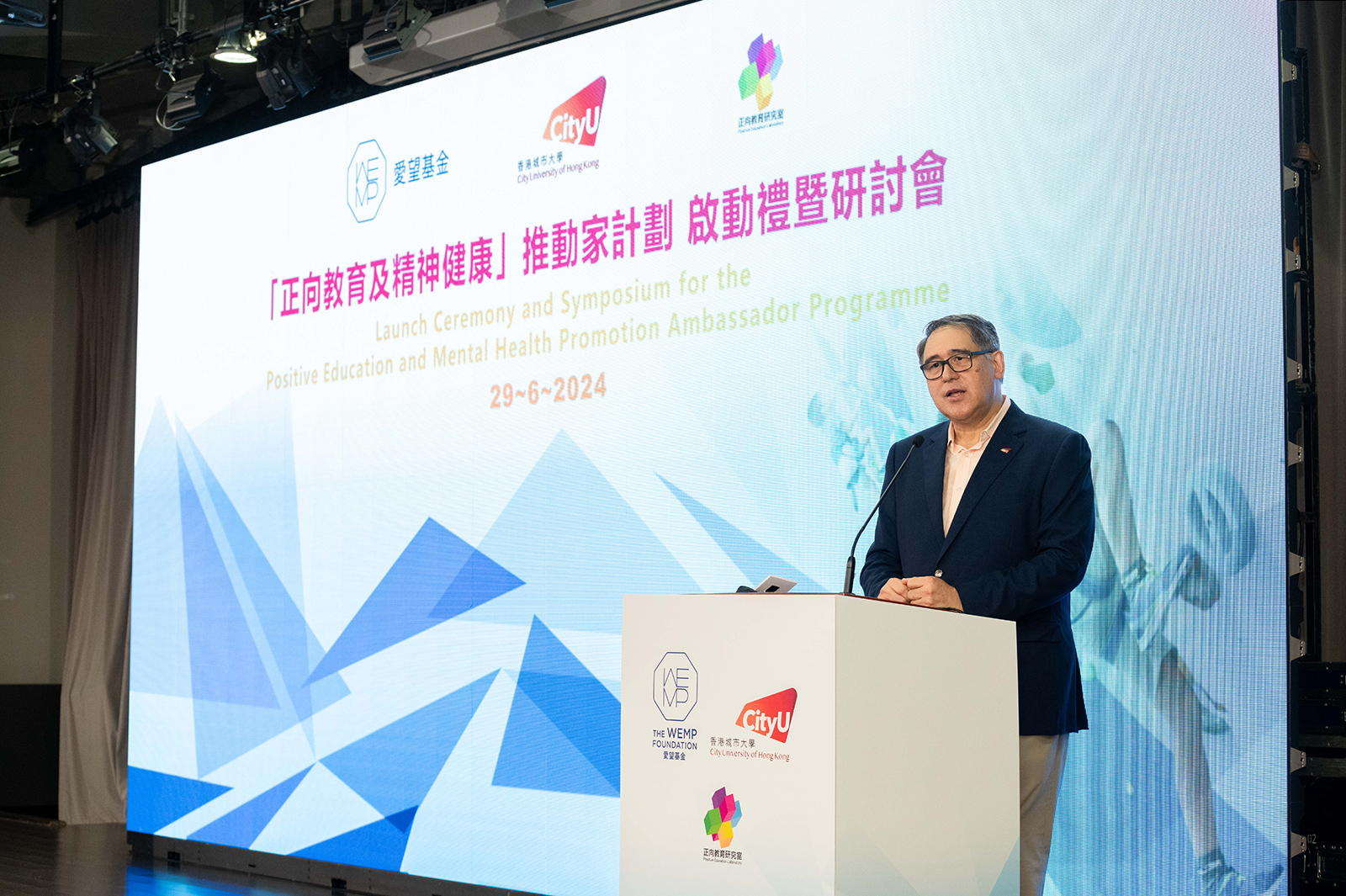
City University of Hong Kong’s (CityUHK) Positive Education Laboratory joined hands with The WEMP Foundation (WEMP) to hold the Launch Ceremony and Symposium for the Positive Education and Mental Health Promotion Ambassador Programme on 29 June, with the aim of promoting positive education among teachers and parents through various courses and activities between 2024 and 2026 to further enhance student well-being and mental health.

Speaking at the ceremony, Mr Lester Garson Huang, CityUHK Council Chairman, said that he was delighted to witness the collaboration between CityUHK and WEMP to promote positive education. He believed that with the research and practical experience of the Positive Education Laboratory, as well as the multi-disciplinary experts gathered by WEMP, they can promote a positive culture on campus and in the community, creating a better environment for the next generation.

Mrs Jennifer Yu Cheng, Director of The WEMP Foundation, said: "Sustainable social development depends on the mental well-being of the younger generation. WEMP is committed to collaborating with parents and schools to nurture children’s positive thinking." She also expressed her hope that collaborating with CityUHK will help children tap into their talents and contribute to a happy, healthy future society.
Dr the Honourable Ko Wing-man, GBS, JP, Member of the Executive Council of the HKSAR said that the Education Bureau is committed to implementing “Positive Education” and “Enhancing Campus Well-being” though a multi-pronged approach to support student growth by optimising in-school education, strengthening home-school co-operation, inspiring students’ positive thinking and promoting their mental health. He also encouraged cooperation among government, business and the community to further enhance community support and social worker training, ultimately creating greater value for society.
During his speech, Professor Lee Chun-sing, CityUHK Provost and Deputy President, said that he was grateful for the collaboration between CityUHK and WEMP to support positive education programmes. He added that the Positive Education Laboratory has promoted a positive culture in Hong Kong for over a decade and that it not only nurtures CityUHK students, but also contributes its research findings and practical experience to foster a better growth experience for students in primary schools, secondary schools and other universities.


CityUHK’s Positive Education Laboratory has been dedicated to promoting mental health and positive education for many years. Collaborating with over 400 primary and secondary schools over the years, it has offered diverse courses and activities for teachers, parents and students. To strengthen positive emotions and promote mental well-being in students, the upcoming two-year programme will be fully funded by WEMP, providing free 20-hour certificate courses and related activities.
Also at the symposium, Professor Sylvia Kwok Lai Yuk-ching, from the Department of Social and Behavioural Sciences, shared the results of a mental health survey conducted among 4,002 local primary and secondary school students, teachers and parents.
In terms of students’ mental health, nearly one-third of primary students perceived themselves as having a moderate to high level of depression (27.4%), anxiety (21.6%) and stress (29.2%). Additionally, 40.6% of primary students reported moderate or high levels of fear related to the pandemic, reflecting the highest levels of depression, anxiety and stress during 2020-21 over the past three years. As for secondary students, although more than 82.7% of the respondents believe they possess moderate or high resilience, they also experience moderate to severe levels of depression (46.4%), anxiety (38.3%) and stress (52.1%).
Regarding parents’ mental health, secondary student's parents exhibit higher levels of depression, anxiety and stress than primary students' parents. Only about 12.6% of primary students' parents experience moderate or high levels of depression, and 7.1% report anxiety symptoms. In contrast, over 36.3% and over 15.5% of secondary student's parents experience moderate or high levels of depression and anxiety, respectively. During the COVID-19 pandemic, over 75.3% of primary students' parents faced moderate or high stress levels related to parenting.

Regarding teachers’ mental health, more than 24.1% of primary school teachers and 21% of secondary school teachers had scores indicating moderate or high negative emotions. Over the past three years, primary school teachers experienced an increase in negative emotions, with significant declines in job satisfaction and satisfaction with school management. Among primary school teachers, over 16.1% reported facing moderate or high stress levels during the pandemic.
Professor Kwok said that the survey found that the overall well-being, depression, anxiety and stress of students can be predicted by parents’ negative emotions, physical condition and stress. If the relationship between parents and students deteriorates, along with their physical condition, it may exacerbate negative emotions in students.
She added that the programme effectively helps students, parents and teachers face challenges from studies, life and work with a positive mindset. Learning various emotional coping strategies and leveraging character strengths enhances learning motivation and resilience while reducing the occurrence of negative emotions. “The mental health of parents and teachers is closely related to the psychological well-being of children,” she said. “We recommend that schools adopt the whole-school positive education approach to enhance the mental health of parents and teachers. Therefore, CityUHK and WEMP are collaborating to provide free Positive Education and Mental Health training courses for teachers and parents to promote positive education and improve the mental health of parents and teachers.”






